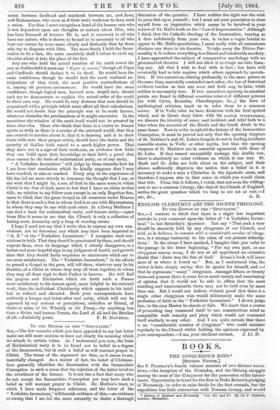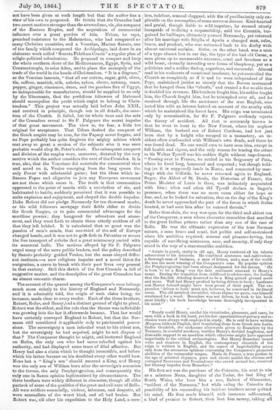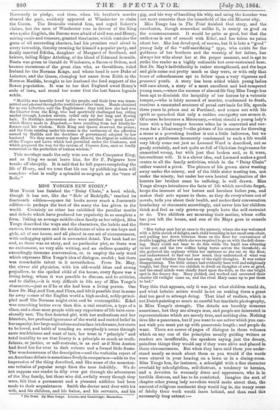BOOKS.
THE CONQUEROR'S SONS.•
[SECOND NOTICE.]
SIR F. PALGRAVE'S fourth volume consists of two distinct narra- tives,—the inception of the Crusades, and the lifelong struggle among the sons of the Conqueror for the possession of his inheri- tance. Opportunity is found for the first in Duke Robert's pledging of Normandy, in order to raise funds for the first crusade, but the expedition has little connection with Norman history, and would • History of England and Normandy. Vols. HI. and IV. By Sir F. Palgrave. London : Macmillan. not have been given at such length but that the author has a view of his own to propound. He thinks that the Crusades had two secret motives stronger than the avowedone, viz., the conquest of the Eastern Empire, and the acquisition of commercial influence over a great portion of Asia. Urban, he says, preached resistance to the Mahometan, who had conquered so many Christian countries, and a Venetian, Marino Sanuto, one of the family which conquered the Archipelago, laid down in an elaborate work called ‘-Secreta Fidelium Crucis" a regular plan of religio-political colonization. He proposed to conquer and keep the whole southern shore of the Mediterranean, Egypt, Syria, and Constantinople, to seize Aden, and to place the monopoly of the trade of the world in the hands of Christendom. " It is a disgrace," as the Venetian laments, " that all our cotton, sugar, gold, silver, tin, saffron, mastick, silk, cubebs, spices, cloves, nutmeg, mace, pepper, ginger, cinnamon, dates, and the peerless flax of Egypt, so indispensable for manufactures, should be supplied to us only by the Miscreants, that the perfidious followers of Mahound should monopolize the profit which ought to belong to Chris- tendom." This project was actually laid before John XXII., and received in principle, though not in all details, the sanc- tion of the Chufch. It failed, F. its whole tone and the acts F of the Crusaders reveal to Sir . Palgrave the secret impulse of that great movement. The view is, we fear, a little too original for acceptance. That Urban desired the conquest of the Greek empire may be true, for the Papacy never forgets, and no Pope probably has quite forgiven the mighty schism which rent away so great a section of the subjects who it was once probable would obey St. Peter's chair. The subsequent conquest and division of the empire were, moreover, dictated by the very motive which the author considers the root of the Crusades. It is true, also, that the Venetians did entertain the commercial view and acted on it, Venice emerging from the long spasm the only Power with substantial gains ; but the ideas which in- fluence Popes and oligarchs to join any European movement are not those which cause it. The truth is that communities oppressed to the point of mania with a conviction of sin, and habituated to battle, suddenly perceived that it was possible to unite expiation and enjoyment, and obeyed the double impulse. Duke Robert did not pledge Normandy for ten thousand marks, or his wild followers mortgage their fields either to divide the Greek Empire, or to gain commercial advantages for the maritime powers ; they hungered for adventure and atone- ment, and they went forth to obtain them utterly reckless of all that they left behind. It is calculated that so great was the passion of men's minds, that one-third of the soil of Europe changed hands, and it was not to gain fiefs in Palestine or secure the free transport of cubebs that a great aristocracy parted with its ancestral halls. The motives alleged by Sir F. Palgrave urged many of the more politic leaders, and the policy described by Sanuto probably guided Venice, but the mass obeyed differ- ent instincts,—a new religious impulse and a novel thirst for emigration, a crave to break with their past lives very general in that century. Still this sketch of the first Crusade is full of suggestive matter, and the description of the great Crusaders has an almost romantic charm.
The account of the quarrel among the Conqueror's sons belongs much more strictly to the history of England and Normandy, and it is admirably told, the origin of each claim being, for instance, made clear to every reader. Each of the three brothers, Robert, Rufus, and Henry,liad a distinct ground of right to plead. Robert was the eldest, and the rule that the throne was indivisible was growing into the law it afterwards became. That law would have certainly conveyed England to Robert, but that the Nor- mans still considered it applicable only to patrimonial posses- sions. The sovereignty a man inherited went to his eldest son, but the sovereignty he had acquired, might be not dispose of that ? The Conqueror thought he might, and bestowed England on Rufus, the only son who had never rebelled against his authority, and had displayed some trace of filial affection. But Henry had also a claim which he thought irresistible, and before which his father foresaw on his deathbed every other would bow. None but a " King's son" should succeed a King, and Henry was the only son of William born after the sovereign's accession to the throne, the only Porphyrogenitus, and consequently the only one in Saxon opinion legitimatized by circumstances. The three brothers were widely different in character, though all alike partook of some of the qualities of the great and evil race of Rollo. All were soldiers essentially, violent, inhuman, and despotic, all were sensualists of the worst kind, and all had brains. But Robert was, till after his expedition to the Holy Land, a care- less, indolent, sensual sluggard, with fits of pusillanimity only ex- plicable on the assumption of some nervous disease. Kind-hearted and genial, though liable to wild impulses, he seemed utterly incapable of realizing a responsibility, sold the Cotentin, bar- gained for bailliages, ultimately pawned Normandy, yet returned after his marriage with Sibylla of Apulia a changed man, calm, brave, and prudent, who was welcomed back to his duchy with almost universal acclaim. Rufus, on the other hand, was a man of a type almost lost in our day, the typo of the bad old Caesar, a man given up to unnameable excesses, cruel and ferocious as a wild beast, eternally inventing new forms of blasphemy, yet as a politician and a soldier daring, sagacious, and successful. Almost mad in his outbursts of occasional insolence, lie yet controlled the Church as completely as if it and he were independent of the Pope, maintained justice so sternly that the Barons murmured that he hanged them like "churls," and created a fist so able that it doubled his revenue. His brothers fought him, his nobles fought him, the Church fought him, but ho triumphed over all, and he received through life the assistance of the true English, who hated him with an intense hatred on account of the cruelty with which he maintained the forest laws. His reign was terminated only by assassination, for Sir F. Palgrave evidently rejects the theory of accident. All that is accurately known is that he went to hunt in the New Forest, where his nephew William, the bastard son of Robert Curthose, had but just been shot by a knight who escaped to a monastery, an in- cident often confounded with William's own death, and there he was found dead. No one would own to have seen him, except in full health and vigour, and the only reason for tracing the crime to Sir Walter Tyrrell was his sudden flight without impediment. " Passing over to France, he settled in his Seigneury of Poix, where he lived long, honoured and respected ; but though hold- ing (as it is supposed) lands in Essex, and connected by mar- riage with the Giffords, he never returned again to England. Suger, the Abbot of St. Denis, the Historian of France, the Prime Minister of Louis le Gros, was intimately acquainted with him ; often and often did Tyrrell declare in Suger's presence, when there was no more room either for hope or fear, and, as he looked for salvation, that on the day of the King's death he never approached the part of the forest in which Rufus hunted, or had seen him after he entered therein."
Rufus thus slain, the way was open for the third and ablest son of the Conqueror, a man whose character resembles that ascribed to the great Italian princes rather than any one of the race of Rollo. He was the ultimate expression of the true Norman nature, a man brave and cruel, but politic and self-restrained when his ambition required, sensual and pleasure-loving, but capable of sacrificing mistresses, ease, and security, if only they stood in the way of a statesmanlike ambition.
"Astute in youth, crafty in old ago, Henry rendered all his talents subservient to his interests. He combined acuteness and cultivation: a thorough man of business, a man of letters, and a man of the world. He was the most winning of the Conqueror's sons. By popular opinion the" Porphyrogenitus had been always designated for the throne. He is born to be a King' was the first sentiment annexed to Henry's name. During the transition from childhood to adolescence, the feeling that the Enplish Atheling deserved to be a King gained ground more and more. Well had Henry profited by being driven to book ; Lanfrano and Master Achard might have been proud of their pupil. The ex- pression driven to book' must not, however, be construed in its literal sense. The old metrical chronicler, whose rhyme we quote, was himself straitened for a word. Beauclerc was not driven, ho took to his book most kindly ; his book knowledge became thoroughly incorporated in his mind."
• • • • • • "Rarely could Henry, amidst his vicissitudes, pleasures, and cares, be seen with a book in his hand, yet his few opportunities of privacy and were always well employed in study. He is said to have written .lsopean fables in English, first translating them from Greek into Latin. Gaffer Goodrich, the nickname afterwards given to Beauclerc by the Normans' in scornful mockery, testifies Henry's decided Anglicism, and thus adds support to an assertion which otherwise might have appeared improbable to the critical archaeologists. But Henry Beauclerc issued writs and charters in English, the contemporary chronicle of his reign is written in English, and the aspect of improbability arises only from the erroneous opinions concerning the Conqueror's projected abolition of the vernacular tongue. Marie de France, a true poetess is the age of minstrel rbymers, pure and chaste amidst the obscene and corrupted Trouveurs and Troubadours who crowd around her, received her literary impulse from Beauclerc."
His first act was the purchase of the Cotentin, his next to win as a mistress Nests, daughter of the Tudor, the last King of South Wales, who bore him a son, Robert of Gloucester, "noblest of the Normans," but while ruling the Cotentin the possibility of his succeeding his heirless brothers never quitted his mind. He first made himself, with immense self-control, a kind of premier to Robert, then lent him money, taking all Normandy in pledge, and then, when his brother's murder cleared the path, suddenly appeared at Winchester to claim the Crown. The Breteuila resisted him, and urged Robert's claims, but the men of Winchester rose in favour of the King who spoke English, the Barons were afraid of civil war, and Henry, seizing castle and treasure, granted thecharter, which contains the germ of all succeeding charters, had his promises read aloud iu every township, thereby creating for himself a popular party, and finally married Editha, daughter of Margaret of Scotland, and heiress, failing Edgar Atheling, of the blood of Edmund Ironside.
Neste was given to Gerald de Windesore, a Saxon or Briton, and became ancestress of the great clan who, as Geraldines, ruled Ireland for the Norman Kings, and whose head is now Duke of Leinster, and the Queen, changing her name from Edith to the Norman Matilda, brought to her husband the fond support of the Saxon population. It was to her that England owed Henry's code of laws, and round her name that the last Saxon legends settle.
"Matilda was heartily loved by the people, and their love was trans- mitted and adorned through the traditions of after times. Maude obtained for us our Liberties, said the Englishman : they told how she had won the Charter from the King, who had sportively challenged her, riding unclad through London streets, veiled only by her long and flowing hair. To Matilda's intercession also were ascribed the good Laws' which Henry made in Engelonde,— laws resulting from her kindly in- fluence and his wisdom. Both King and Queen deserved the praise ; and the Code existing under his name is the testimony of the affection earned by Matilda and the doctrines of government adopted by her husband. We thus must receive Leger Henrici, the Digest or collection of the Usages and Laws which had prevailed under the Confessor, and which prepared the way for the system of Common Law, once so fondly venerated as the perfection of human wisdom."
This marriage made the only wise son of the Conqueror King, and as King we must leave him, for Sir F. Palgrave here breaks off abruptly. It is said that he left papers completing the life of Henry, and we trust that his son by publishing them Will complete what is really a splendid monograph on the "race of Rollo."
































 Previous page
Previous page